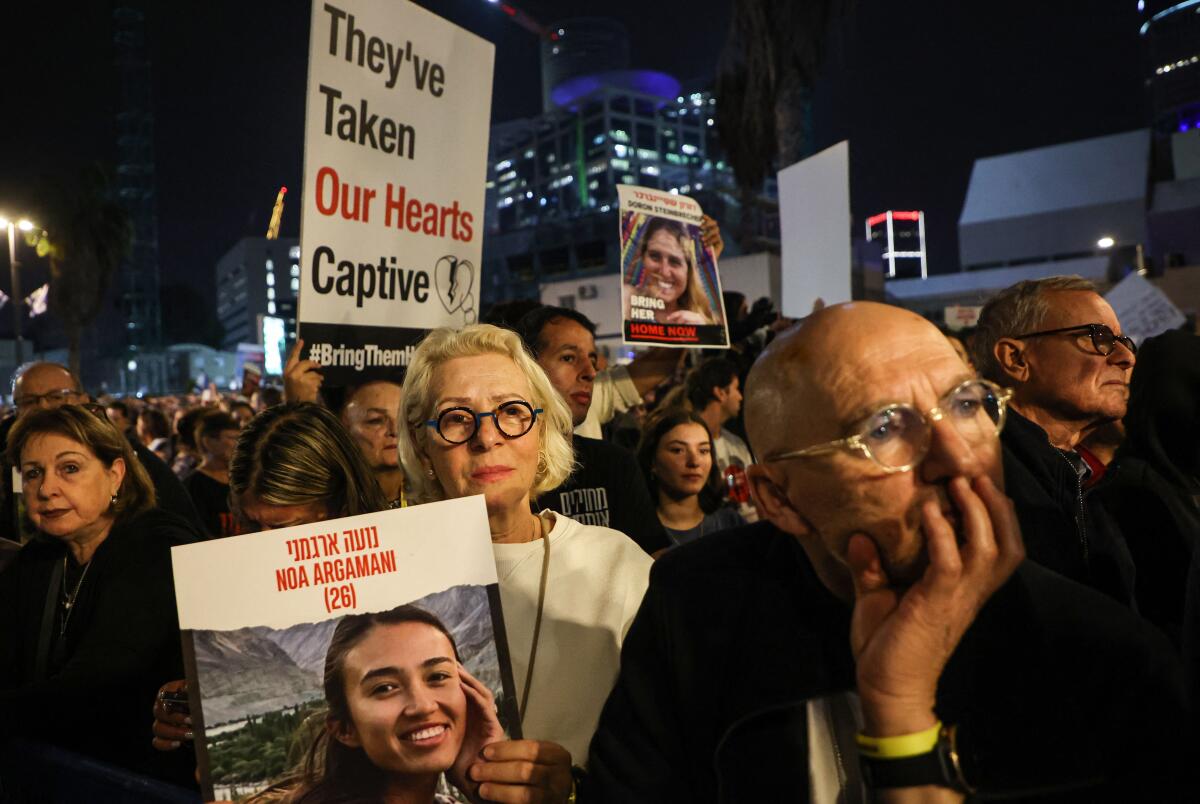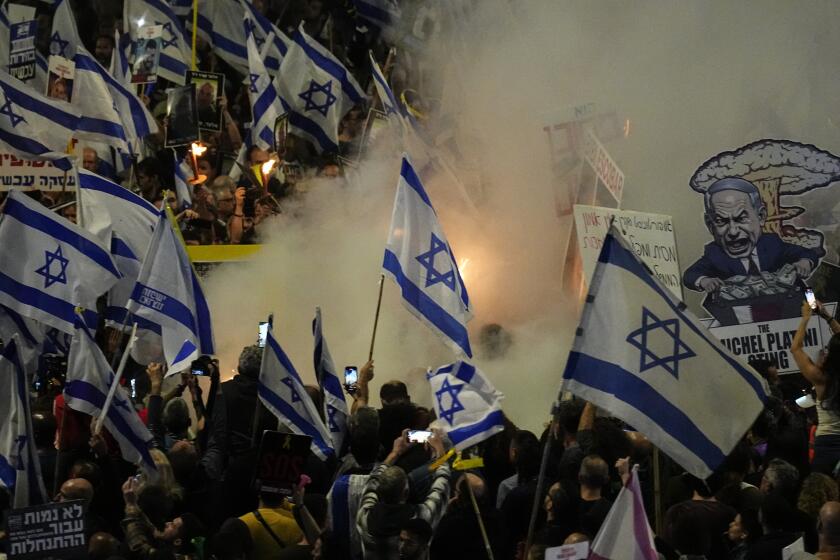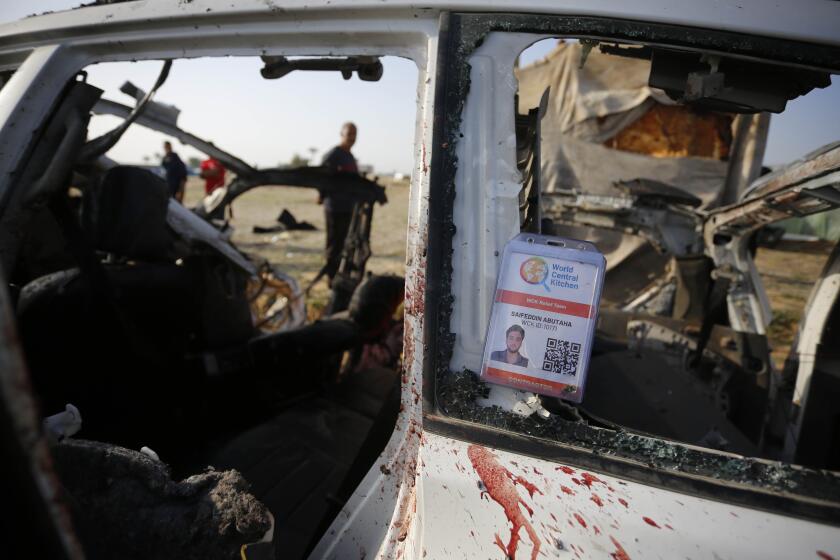For families of hostages, it’s a race against time as Israel’s war reaches six-month mark

- Share via
JERUSALEM — It’s the last wish of a dying mother, to be with her daughter once more. But six months into Israel’s war against Hamas, time is running out for Liora Argamani, who hopes to stay alive long enough to see her kidnapped daughter come home.
“I want to see her one more time. Talk to her one more time,” said Argamani, 61, who has stage four brain cancer. “I don’t have a lot of time left in this world.”
Noa Argamani was abducted from a music festival Oct. 7 when Hamas-led militants stormed into southern Israel, killing some 1,200 people and taking about 250 hostage. The video of her abduction was among the first to surface, images of her horrified face widely shared — Noa detained between two men on a motorcycle, one arm outstretched and the other held down as she screams “Don’t kill me!”
There’s been little news about Noa, 26. But in mid-January, Hamas released a video of her in captivity. She appears gaunt and under duress, speaking about other hostages killed in airstrikes and frantically calling on Israel to bring her and others home.
Half a year into Israel’s war, agonized families such as the Argamanis are in a race against time. In November, a weeklong cease-fire deal saw the release of more than 100 hostages. But the war is dragging on, with more than 33,000 Palestinians killed by Israeli bombardment and ground attacks in Gaza. Calls for cease-fire increase along with massive displacement and warnings of famine in the territory.
Israel’s military says it has recovered the body of a 47-year-old farmer who was held hostage in Gaza.
But there is no end in sight and no serious hostage deal on the table. Israel says more than 130 hostages remain, with about a quarter of those believed dead, and divisions are deepening in the country over the best way to bring them home.
Israeli Prime Minister Benjamin Netanyahu has vowed to both eliminate Hamas and bring all the hostages back, but he’s made little progress. He faces pressure to resign, and the U.S. has threatened to scale back its support over the humanitarian situation in Gaza.
Israelis are divided into two main camps: those who want the government to put the war on hold and free the hostages, and others who think the hostages are an unfortunate price to pay for eradicating Hamas.
“They have these two goals and the assessment of the type of risk they’re willing to take to get the hostages back — this is where you see divisions,” said Shmuel Rosner, a senior fellow at the Jewish People Policy Institute and analyst for Israeli public television station Kan News.
On-and-off negotiations mediated by Qatar, the United States and Egypt have yielded little. If a viable deal emerges, decisions will become harder and the divisions sharper, Rosner said.
But for most families and friends whose loved ones are in captivity, there is no choice but to bring them home. Many are concerned in particular about the women held in Gaza and say, based on testimonies from freed hostages, they fear those remaining could be suffering from sexual abuse.
Staffers from World Central Kitchen, chef José Andrés’ humanitarian aid group trying to get food to Palestinians in Gaza, were killed in Israeli airstrikes.
Before a recent parliamentary committee meeting, attendees held posters showing the hostages. Yarden Gonen, whose 23-year-old sister, Romi, also was taken from the Oct. 7 music festival, criticized what she said was the government’s inaction.
“What are we fighting for?” she said. “What is more important than this?”
Outside an art installation mimicking the Gaza tunnels where some hostages are believed to be held, Romi’s mother said she can’t believe it’s been half a year, with much of the world wanting to forget or ignore such a horrible situation.
“We are doing everything we can so the world will not forget,” Merav Leshem Gonen said. “Every day we wake up and take a big breath, deep breath, and continue walking, continue doing the things that will bring her back.”
When Yonatan Levi saw the video of his friend Noa Argamani in captivity, he said he could barely recognize the smart, free spirit of the woman who loved parties and traveling and was studying computer science.
“When I saw that video, I thought maybe she’s living physically but has died inside,” said Levi, who met Argamani during a diving course in the southern Israeli city of Eilat.
A few months before her abduction, Argamani asked Levi to help navigate insurance issues for her mom, he said. As an only child, she was a big part of her mother’s life and care, and she seemed hopeful she would be OK, Levi said.
Religious Zionists, most believing in a divine right to govern, now have outsize influence in Israel. The war in the Gaza Strip is energizing their settlement push.
But Liora Argamani’s cancer has worsened, according to a video released by the Hostages and Missing Families Forum.
In it, Liora and her husband tearfully thumb through childhood photos of Noa. From her wheelchair, Liora addresses the camera — and President Biden directly. Behind her rests an enlarged photo of Noa’s pained face as she’s dragged into Gaza, on a posterboard with her words overtop: “DON’T KILL ME!”
“My heart really hurts,” Liora, a Chinese immigrant, says slowly in accented Hebrew. “I am asking you, President Joe Biden. ... I am really begging you.”
The stress of missing a loved one like Noa is hard on the healthiest of people, and it will only exacerbate a condition such as cancer, said Ofrit Shapira Berman, a psychoanalyst who heads a group of health professionals treating freed hostages, families and survivors.
“The fact that so much of her psychic energy is invested in her daughter’s trauma leaves her lesser chance to survive,” Berman said.
In the video, Noa’s father, Yaakov Argamani, strokes the family photo albums and chokes back tears.
“I miss everything about her,” he says. “Her hug. The hug I wanted to ...”
Unable to finish, he simply nods and the camera cuts away.
Mednick writes for the Associated Press. AP reporters Ami Bentov in Tel Aviv and Tia Goldenberg in Jerusalem and a Times staff writer contributed to this report.
More to Read
Sign up for Essential California
The most important California stories and recommendations in your inbox every morning.
You may occasionally receive promotional content from the Los Angeles Times.
















